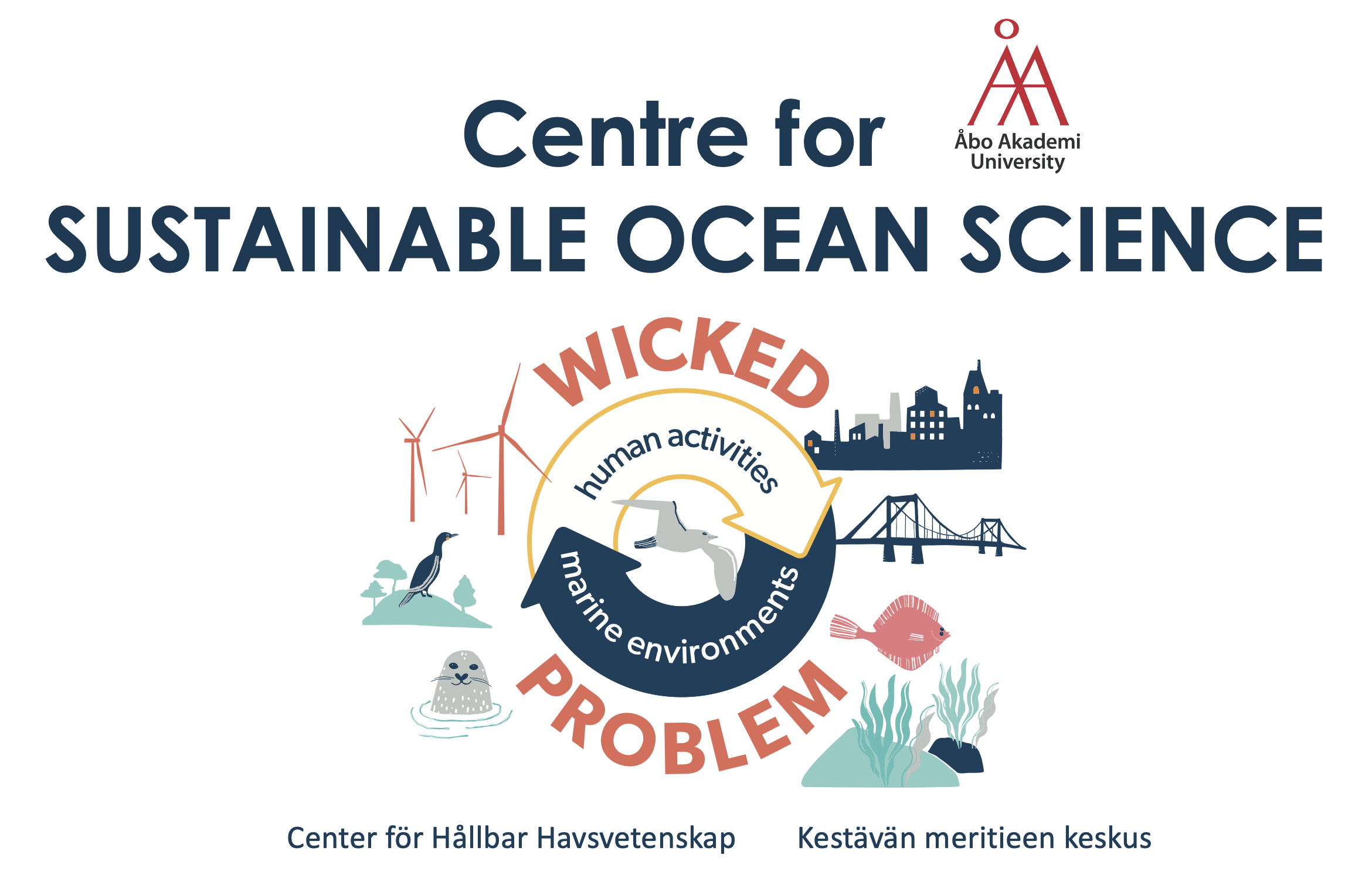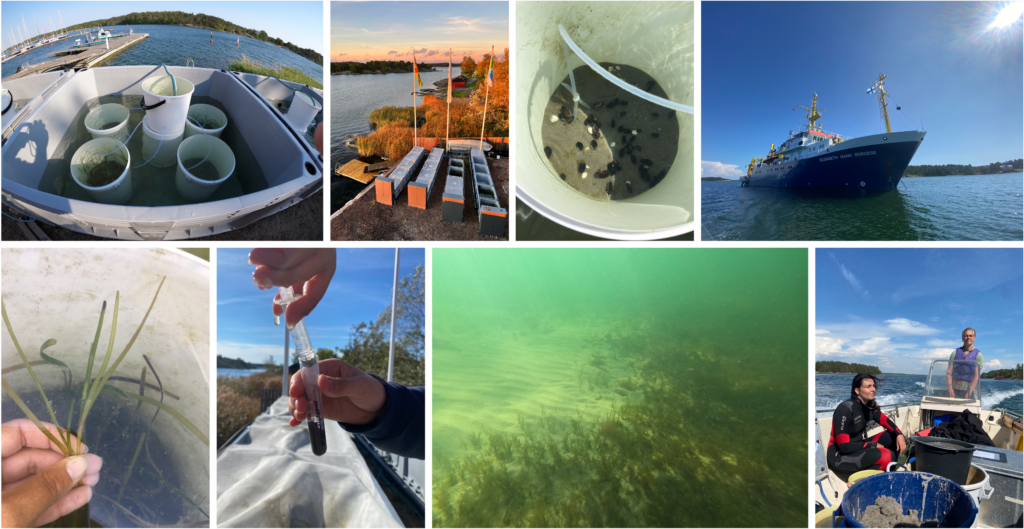2026 – 2028 # NEMESIS (Networked Environmental Monitoring and Evaluation System for Intelligent Surveillance) research infrastructure (RI) Thematic research infrastructures: Local research infrastructures to strengthen regional R&D
This is a joint research infrastructure funding for Turku higher education institutions from the Research Council of Finland. The NEMESIS research infrastructure collects environmental and maritime safety data throughout the Archipelago Sea region. A collaboration between three higher education institutions, NEMESIS enables research on environmental and security anomalies, as well as long-term monitoring of changes in marine areas.
Lead and main applicant: Jarkko Paavola and Emil Nymann at the Turku University of Applied Sciences, Elina Kasvi at the University of Turku and Christian Pansch at Åbo Akademi University
It is a great opportunity to work closely together with the different partners to collect essential environmental data in the Archipelago Sea, one of the largest Archipelagos worldwide. We can now measure ‘marine weather’ and identify thermal microclimates, which play a key role in understanding the impacts of global warming on marine ecosystems.
2024 – 2028 # Collaborator within Susanne Kortsch’s Academy fellowship that was funded by the Research Council of Finland for the project “Heatwave-driven rewiring of coastal food webs” at the University of Helsinki
This project aims to predict how coastal ecosystems, and their food webs in particular, respond to marine heatwaves, an increasingly common consequence of climate change and one of the most pervasive threats to global marine biodiversity.
2024 – 2028 # SOS – Centre for Sustainable Ocean Science
 transdisciplinary and user-centric paradigm for identifying and analysing marine biodiversity-related wicked problems and their solutions that supports sustainability transitions. It enables ÅAU to be a world leader in transdisciplinary ocean science and a driver of UN’s Ocean Decade work.
transdisciplinary and user-centric paradigm for identifying and analysing marine biodiversity-related wicked problems and their solutions that supports sustainability transitions. It enables ÅAU to be a world leader in transdisciplinary ocean science and a driver of UN’s Ocean Decade work.
2023 – 2027 # PhD project Sarah Rühmkorff within the doctoral programme of Biosciences, Environmental and Marine Biology at Åbo Akademi University: “Resilience of Seagrass Ecosystems through Habitat Heterogeneity and Genetic Diversity”
Archipelagic highly dynamic environmental (temperature) gradients challenge organisms to adapt and survive, as they have to cope with rapid changes over multiple temporal scales. Importantly, it is unknown how the environmental background can shape the response of seagrass to heat stress and if seagrass living in high-variability environments (more stress), can adapt better towards heat stress than sheltered seagrass (environment more constant). The predominantly monospecific, but presumably phenotypically diverse seagrass meadows in the Archipelago Sea, therefore, provide an ideal model system to test this concept. Through the simulation of thermal gradients in mesocosm settings, this project (a) quantifies phenotypic traits of selected seagrass populations across and within seagrass clones, (b) assesses their potential for adaptation to environmental change on heat resistance, and (c) correlates population origin  with heat tolerance and distinct ecological functions (e.g. nutrient uptake, sediment stabilisation).
with heat tolerance and distinct ecological functions (e.g. nutrient uptake, sediment stabilisation).
2024 – 2028 # EU Horizon CL6-2023-Climate: SEA-Quester – Blue Carbon production, export, and sequestration in emerging polar ecosystems
WP-6: Effects of climate change and anthropogenic stressors, with A. Thörnroos-Remes & C. Boström

2023 – 2028 # The Research Council of Norway (Forskningsrädet): NORSE – Biodiversity in Northern European Seagrass meadows – drivers, responses, and resilience
Lead and main applicant: Karine Gagnon Havforskningsinstituttet Bergen NO
–> Recently endorsed as a UN Decade of Ocean Science, IOC-UNESCO project
2021 – 2024 # BiodivERsA Call on Biodiversity and Climate Change: Pathogenic Vibrio bacteria in the current and future Baltic Sea waters: mitigating the problem (BaltVib)

Vibrio – microbes that are part of the natural bacterioplankton in temperate marine waters – have in recent years flourished in the Baltic Sea, probably stimulated by elevated surface water temperatures. Several Vibrio species are human pathogens. It is hence of great concern that Vibrio-related wound infections and fatalities have increased dramatically along the Baltic coasts. Future climate change is predicted to escalate this problem, posing a significant threat to human health and the Baltic tourism industry. However, the projections do not yet take into account the influence of ‘ecosystem engineers’ such as mussels and macrophytes on Vibrio diversity and abundance. Recent data indicate that in some of the ‘ecosystem engineers’ habitats the abundance of pathogenic Vibrio spp. is reduced. This opens up the option for nature-based solution (NbS) strategies to control pathogenic vibrios in the nearshore habitat where humans interact with the sea. However, climate change will also affect the structure and functioning of the ecosystem engineers, with as yet unknown consequences for the Vibrio populations in the Baltic Sea. BaltVib aims to delineate the current and future Vibrio status, determine biotic and abiotic key factors regulating Vibrio prevalence, and identify NbSs to mitigate the problem. This will be accomplished through interdisciplinary integration of marine, microbiological, molecular and socio- ecological expertise carried by partners from seven Baltic nations.
2021 – 2025 # PhD project Lucinda Kraufvelin within the doctoral programme of Biosciences, Environmental and Marine Biology at Åbo Akademi University: “Impacts of marine heatwaves on the functioning of temperate coastal ecosystems under the influence of non-indigenous species”
 The objective of the proposed research is to (i) determine the effects of marine heatwaves on the functionality of critical temperate coastal ecosystems. Additionally, this research aims to (ii) examine the impact of marine heatwaves on selected non-indigenous species, as well as (iii) to determine whether responses of native species to marine heatwaves are affected by the presence of the chosen non-indigenous species, and (iv) to clarify if and how these responses may alter the functionality of a stressed system.
The objective of the proposed research is to (i) determine the effects of marine heatwaves on the functionality of critical temperate coastal ecosystems. Additionally, this research aims to (ii) examine the impact of marine heatwaves on selected non-indigenous species, as well as (iii) to determine whether responses of native species to marine heatwaves are affected by the presence of the chosen non-indigenous species, and (iv) to clarify if and how these responses may alter the functionality of a stressed system.
2021 – 2022 # Svenska Kulturfonden: Marine heatwaves in the Archipelago Sea – from identification and measuring their impacts, to implementation of mitigation strategies

This project applies different approaches to serve the particular question: Can we – by local measures – mitigate the negative impacts from globally driven extreme events such as marine heatwaves in the Archipelago Sea? As one result of global warming, marine heatwaves are increasingly found worldwide, and their intensification if projected for the near future. Heat stress often drives species beyond their thermal limits with consequences for the individual performance, and a risk of loss of sensitive species and ecosystem collapse, while additional – often local – stress may exacerbate the negative impacts from marine heatwaves. By means of data modelling and experimental ecological research, we identified the occurrence of marine heatwaves in the Archipelago Sea and will now test their impacts on Archipelago Sea marine ecosystems in simulated mesocosm experiments. We will further classify and test the main local drivers that intensify the negative impact from heat stress in the Archipelago Sea. This will help developing mitigation strategies during the occurrence of these extremes, which might be temporal reductions in boat noise and wave emissions, reductions in micro- or macro-plastics, local eutrophication or temporal restrictions in identified key habitats. In combination with a monitoring and information system, indicating the occurrence of heatwaves to researchers and to society in public exhibitions and the web, this project will identify the potential of mitigating the negative impact from global extreme events by realistic and effective local measures.
2019 – 2022 # Extreme Events in the Baltic Sea – Fabian Wolf DBU Fellowship

Extreme events like heatwaves and hypoxic upwelling events are projected to occur more often in the future. This project aims to understand the effect of these extreme events on typical Baltic Sea species communities. A 22-year long temperature dataset of the Kiel Fjord is used to analyze and model heatwaves and coldspells, so that the experimental treatments resemble naturally occuring extreme events.
